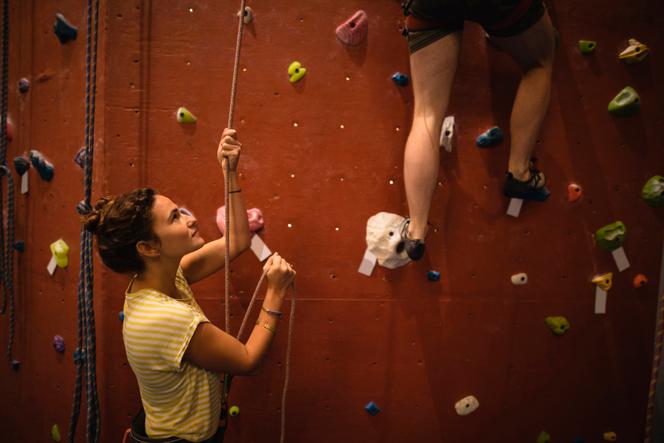


Sandra, William, Gauthier and Maxime (first names have been changed) were warming up with a few stretches in preparation for their climbing session on Monday, January 15. This group of young adults, who live in a Groupe SOS (an NGO dedicated to social purpose entrepreneurship) care home in Chelles (east of Paris) and have autistic spectrum disorders, visit the Arkose climbing gym in Pantin (northeast of Paris) weekly.
The session kicked off with a short warm-up, and then they each went on a climb individually. They put on their harnesses, helped by Amélie (she didn't want to give her surname), a physiotherapist at the care home, and Richard Ly, a climbing instructor and educator. Sandra started with a big smile on her face. She climbed and had to grab rings – red, yellow and blue. She shouted and seemed happy. Then Gauthier and Maxime followed, assisted by Ly, who showed them where to put their feet, and belayed by Amélie, who also practiced. Then it was William's turn; he was more at ease, even if he didn't make it to the top of the 19-meter wall. "Climbing stimulates all parts of the body, and also has social effects, by connecting us with others," explained the physiotherapist. It's equally an empowering and calming activity.
"Climbing works very well with many disabilities – visual, for example, but also disorders such as Down syndrome, autism, hyperactivity, etc.," noted Ghislain Brillet, president of the Union des Salles d'Escalade (UDSE, Union of Climbing Halls). "It's not yet very developed in the field of health sports, but it has the advantage of offering a fun and varied activity," said Matthieu Jung, head of the support department at Strasbourg's Maison Sport-Santé (Sports and Health Center). A project is currently underway with the Bloc en Stock gym in the Alsatian capital, run by Brillet, to offer climbing to people with various back ailments and to children with obesity."
Cyril Lorre, operations and sales manager for the Block'Out group, offers sessions for children born with limb deformities. "They can climb and enjoy it, so it's not a handicap for them," he said. A former French Paralympic triathlon champion himself who lost the use of one arm in a traffic accident, he shared: "Sports saved me. Climbing, which requires concentration, brings calm and serenity to these children, who are sometimes agitated."
For Sophie Boëdec, national medical officer at the Fédération Française de la Montagne et de l'Escalade (FFME, French Federation of Mountaineering and Climbing) there's no doubt that this sport "has many advantages: It's easily accessible, both indoors and outdoors, and there are no contraindications. And it's adaptable to medical conditions." There are few studies on the subject, but, according to the FFME, climbing also improves the musculature of the whole body. "It's a sport that requires and develops many qualities: technique, finesse, flexibility, balance and coordination," wrote Clara Cadinot in her medical dissertation in her medical thesis on the subject defended in 2019.
You have 25% of this article left to read. The rest is for subscribers only.
